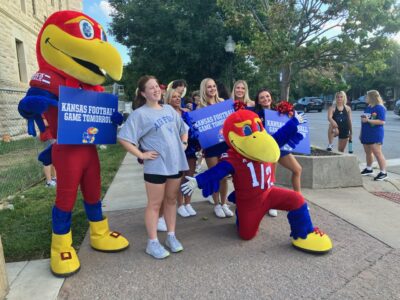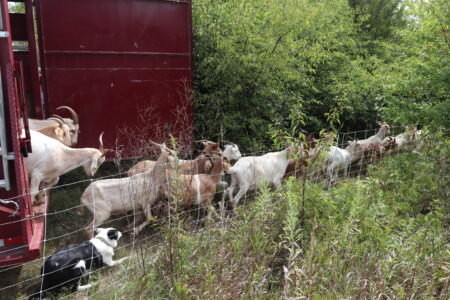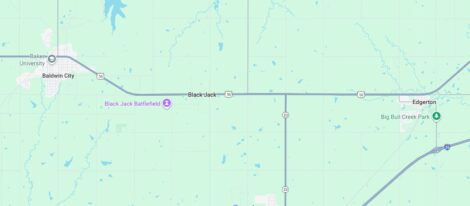U.S. Army aims to complete majority of cleanup at the former Sunflower Army Ammunition Plant by 2028 or 2029
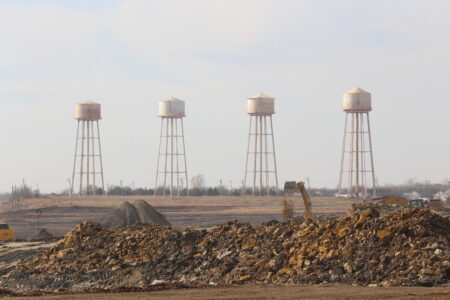
photo by: Chad Lawhorn/Journal-World
Construction crews move earth on the site of the former Sunflower Army Ammunition Plant in De Soto on Nov. 2, 2022, as part of a project to construct a new Panasonic battery plant.
During World War II, the Korean War and the Vietnam War, the site where Panasonic now produces electric vehicle batteries was instead manufacturing tons and tons of powder and propellant for ammunition — and releasing dangerous chemicals into the environment at the same time.
Now, after decades of cleanup efforts, the U.S. Army is getting closer to victory over the pollution that the Sunflower Army Ammunition Plant caused. The Army now expects to be finished with the majority of cleanup at the former ammunition plant site by 2028 or 2029, though funding uncertainties could delay some of the more expensive work.
The former ammunition plant is located in northwest Johnson County, approximately 3 miles southwest of De Soto. Most people now know it as the home of the Panasonic battery facility, but that plant takes up only part of the roughly 10,000-acre site, which has now been rebranded as a business park — Astra Enterprise Park.
When the ammunition plant was established in 1941, it was the world’s largest powder and propellant plant, and it employed 12,000 people in its heyday — Panasonic, by contrast, had 1,100 employees when the plant officially opened last month, and it expects to eventually have 4,000. But the big manufacturing enterprise also caused big pollution — from things like explosives, sulfates, nitrates, heavy metals, organic compounds and pesticides — and since 2005, the Army has been working to clean the site up.
The 2028 to 2029 target is when Scott Smith, environmental protection specialist and site manager for the U.S. Army, told the Journal-World the cleanup should be “mostly” finished. The reason why he said “mostly” is because he doesn’t know when federal funding will be available for remaining cleanup efforts that are projected to be more costly in the future.
Smith said that many Army installations across the country face similar challenges that require investigation and action. Each installation must develop plans to address cleanup efforts, which the Army collects from all sites. However, the Army often receives more plans than it has funding to support.
Smith said that each fiscal year, Congress only gives the Army so much money for cleanup efforts. He added that if there are areas that pose a direct threat to human health, those are often given a higher priority as far as funding goes.
At the Sunflower site, the cleanup has made big strides over the past 10 years especially, Smith said.
“The amount of cleanup that we’ve done since 2015, I’m not going to say it’s a record, but we’ve done a lot of cleanup in a short period of time and worked really hard,” Smith said. “We’ve had a lot of funding to do with it, it’s just, now other priorities are higher than ours.”
In the federal government’s current fiscal year — which runs from Oct. 1, 2024, to Sept. 30, 2025 — the Sunflower Army Ammunition Plant has received approximately $6 million for cleanup, Smith said.
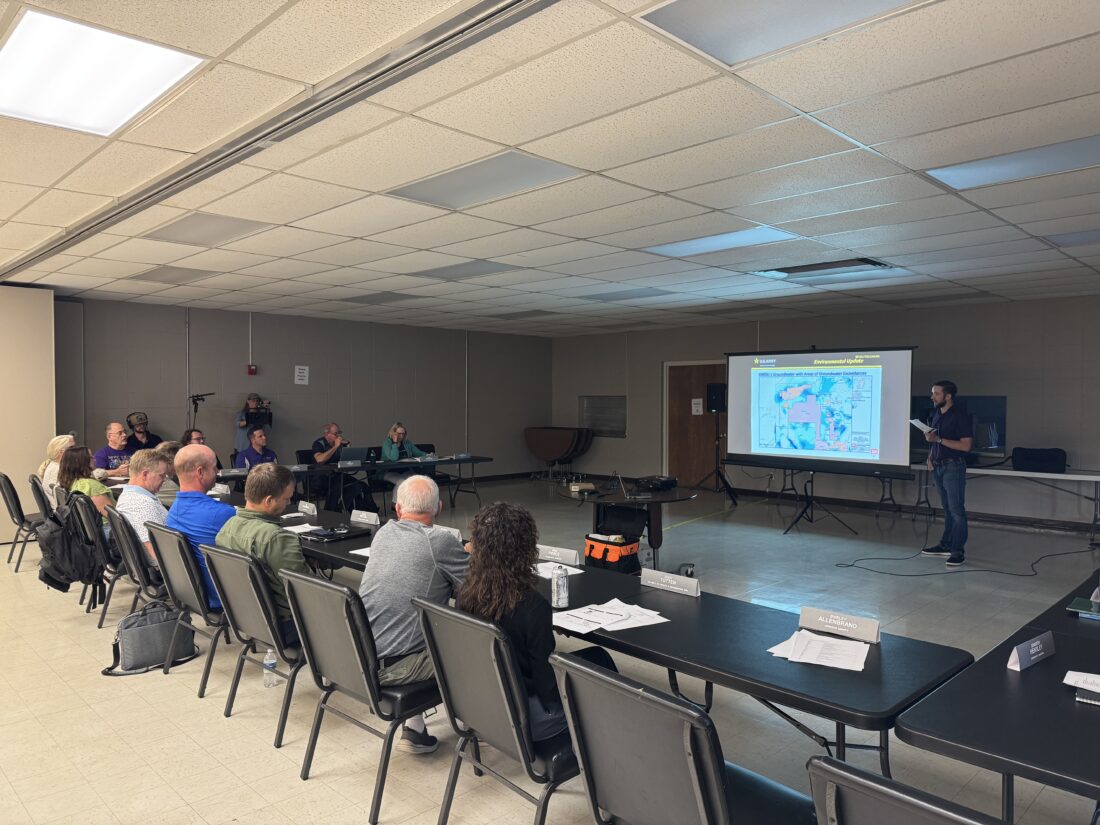
photo by: Josie Heimsoth/Journal-World
The Restoration Advisory Board for the former Sunflower Army Ammunition Plant met on Thursday, August 29, 2025.
He said a significant part of the remediation that is expected to cost millions of dollars involves the large sediment basins on the property in solid waste management units four and five. These basins caught runoff from when the site was in production, and there are several layers of contaminants in there that need to be cleaned up, Smith said.
“All of that soil is going to have to be dug out, all 68,000 yards,” Smith said. “And first you have to dry the pond so that you can dig it up because you can’t dig it up when there’s liquid. So you have lots of steps that you have to go through.”
Smith said that 73 of the 97 sites on the property have been cleaned up. Of those, 24 sites require no further action. The remaining 34 have been cleaned, but are currently awaiting review by the Kansas Department of Health and Environment to ensure all necessary work was completed.
“You send it to KDHE, then they have to have the opportunity and then go through all the details again, make sure that nothing was missed, and then they give us a ‘no further corrective action plan’ letter, saying we agree with you” that the site was sufficiently cleaned up, Smith said.
However, the sites Smith is referring to only account for the soil on the property. Currently, the team is in the process of completing groundwater testing. The plant is being split up into five groundwater units that will be surveyed.
“One (unit) doesn’t mean that everything in there that’s groundwater is contaminated,” Smith said. “We’re looking for that … Eventually, the units will be redrawn (on the map and) instead of a big square, it may have a little cut out here and little cut out here. And then eventually, the hope is, we delineated it.”
The Army hasn’t needed to clean up the entirety of the original site of the plant. Sometime in the 1960s and 1970s, 1,682 acres of the original installation were given to government entities for public use. In 1997, the Army declared the plant no longer needed.
In October 2004, a federal law allowed the Army to transfer the site to a group chosen by the Johnson County Commission, and in July 2005, the Army sent the transfer documents to the governor of Kansas. With the governor’s approval, Johnson County chose Sunflower Redevelopment LLC to redevelop the property, and in August 2005, all 9,065 acres were transferred to them.
The U.S. Army has created a restoration advisory board so the De Soto community would be able to receive updates about the remediation process. There are numerous seats to give different areas of the community a seat at the table. There are two members from Johnson County, one at large from the government and another from Johnson County Parks and Recreation. Additionally, there are representatives from the city of De Soto, Kansas State University, the University of Kansas, the KDHE, Environmental Protection Agency, Panasonic, Friends of the Kaw, Sierra Club and more.
The board meets quarterly, and the third meeting the board has had since its inception was Thursday night. The next meeting is scheduled for Thursday, Nov. 20 at 6 p.m. at the De Soto City Hall Senior Center, 32905 W. 84th St. in De Soto. The public is invited to attend, and the advisory board plans to meet on the fourth Thursday of the last month of each quarter.


